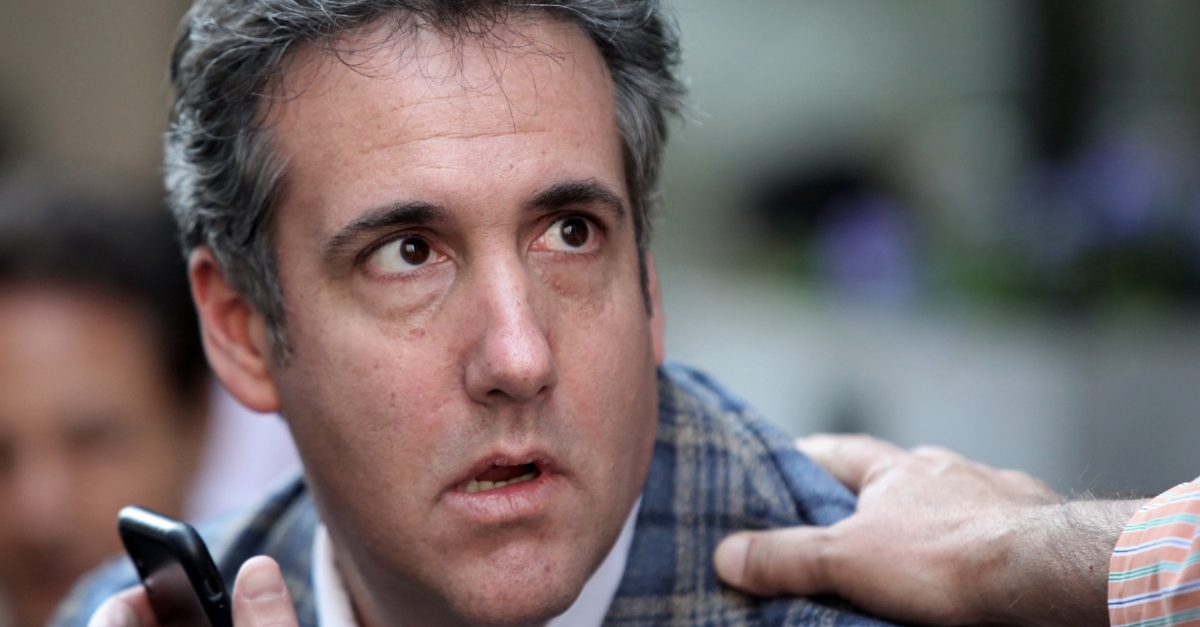
When former Trump fixer Michael Cohen requested that the terms of his imprisonment be adjusted to protect him from contracting coronavirus, we’re sure this wasn’t quite what he had in mind.
According to reports, Cohen was transferred Wednesday to what’s known as a “Special Housing Unit” at the Otisville Federal Correctional Institution–a minimum-security prison outside New York City. Fans of the Netflix show Orange Is the New Black will remember the “SHU” for its less euphemistic name: solitary confinement.
Cohen was reportedly relegated to solitary after he got into some kind of scuffle with another inmate over Cohen’s internet use. Cohen’s attorney Roger B. Adler told Fox News that was his “understanding that a verbal altercation with another inmate prompted a transfer from general population to SHU pending the completion of a routine investigation.”
Perhaps this “verbal altercation” arose because Cohen’s fellow inmates were displeased with Cohen’s social media presence? Since the onset of the global COVID-19 pandemic, Cohen’s Twitter account has been quite active and vocal about the need for prisons to make accommodations to inhibit the spread of the virus.
Confirmed… Inmate tests positive for #coronavirus at FCI Otisville Satellite Camp. It’s time for the Federal Government to act responsibly!
— Michael Cohen (@MichaelCohen212) March 31, 2020
How are you keeping busy during your #COVID19 #coronavirus #quarantine? Send me your stories and pictures (WHITE ENVELOPE ONLY) to Michael Cohen, 86067-054, PO Box 1000, Otisville, New York 10963. Stay safe and strong!
— Michael Cohen (@MichaelCohen212) March 23, 2020
— Michael Cohen (@MichaelCohen212) March 15, 2020
Cohen’s solitary status also comes on the heels of Cohen’s motion to request home confinement, which failed spectacularly. Judge William H. Pauley not only denied the request, but also accused Cohen of having raised COVID-19 in an effort to “single himself out for release to home confinement appears to be just another effort to inject himself into the news cycle.”
Solitary confinement has long been a highly controversial form of punishment; criminal justice reform advocates have argued that the practice is inhumane and harmful to inmates on both physical psychological bases. Indeed, some such detrimental impacts of solitary in a minimum-security setting were one focus of the final season of Orange Is the New Black.
In March 2019, the Solitary Confinement Reform Act was introduced to the Senate; if passed, it would limit the use of solitary confinement as a punishment “to situations in which such segregation is necessary to punish an inmate who has been found to have committed a significant and serious disciplinary infraction” and when “alternative sanctions would not adequately regulate the behavior of the inmate.”
Michael Cohen is currently serving a three-year sentence for tax evasion, bank fraud, and campaign finance violations. While his attorney had argued that this sentence “should not end up being a capital crime depriving my client of his life,” given concerns of COVID-19, Judge Pauley responded that “it’s time that Cohen accept the consequences of his criminal convictions for serious crimes that had far reaching institutional harms.”
Law&Crime spoke Friday with attorney Bruce Barket of Barket Epstein Kearon Aldea & LoTurco, LLP. He explained that placing Michael Cohen in the SHU as punishment for a verbal dispute would be rather odd, though not unprecedented.
“It would be unusual, if that all that took place was a purely ‘verbal’ disagreement,” Barket said. “One would think that Cohen would be smart enough to know where the line is and not to cross it.”
Still, solitary has been used many times for minor infractions.
“Prison officials are sometimes too quick to use the harshest penalty they have, solitary confinement,” Barket said. “That should be reserved for the most serious violations. ”
Editor’s note: This piece was updated post-publication to add a quote from Barket.
[Image via Yana Paskova/Getty Images]